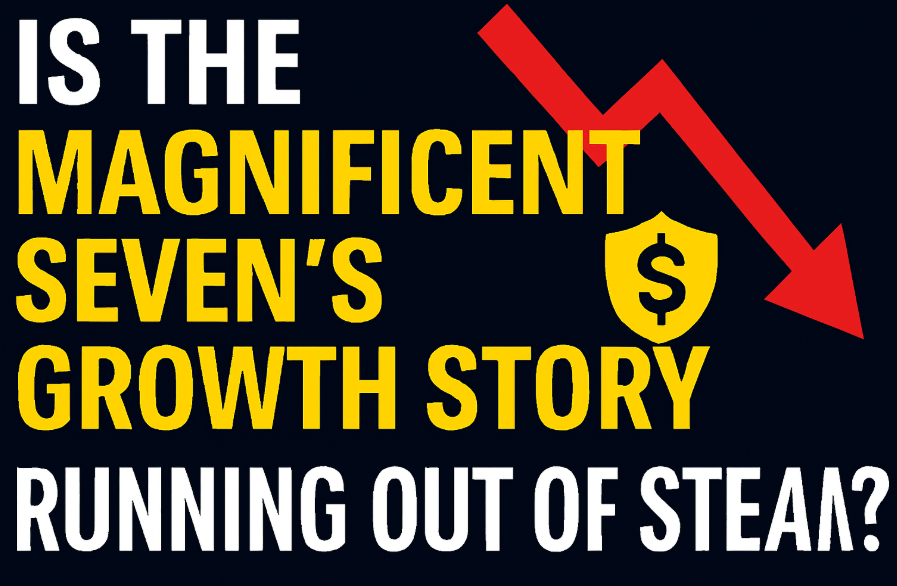- Live Life Grow Wealth
- Posts
- Is the Magnificent Seven’s Growth Story Running Out of Steam?
Is the Magnificent Seven’s Growth Story Running Out of Steam?

Today’s Headline
Is the Magnificent Seven’s Earnings Edge Fading?
Over the past two years, the “Magnificent Seven” — Apple, Microsoft, Amazon, Alphabet, Meta, Tesla, and Nvidia — have dominated the stock market. They carried the S&P 500 higher, drove tech excitement to new levels, and captured almost all of Wall Street’s attention. Their combined market cap today is larger than the GDP of most countries. But lately, I’ve noticed something interesting happening: the unstoppable growth story might be slowing down.
As I watched this earnings season unfold, I started asking myself — are we finally seeing cracks in the armor of these tech giants? Or is this just a temporary pause before their next big surge?
Let’s take a closer look.
Turn AI Into Your Income Stream
The AI economy is booming, and smart entrepreneurs are already profiting. Subscribe to Mindstream and get instant access to 200+ proven strategies to monetize AI tools like ChatGPT, Midjourney, and more. From content creation to automation services, discover actionable ways to build your AI-powered income. No coding required, just practical strategies that work.
1. The Rise That Shook the Market
First, it’s important to remember how we got here.
The “Magnificent Seven” didn’t just appear out of nowhere. They rose to dominance because of their innovation, adaptability, and, of course, massive profitability. From the AI boom led by Nvidia and Microsoft to the e-commerce revolution powered by Amazon and the digital ad recovery from Meta and Alphabet — these companies reshaped how the world works.
In 2023 and early 2024, they accounted for nearly 70% of the S&P 500’s total gains. That’s insane. Investors couldn’t get enough of them. It didn’t matter whether rates were high or inflation was sticky — everyone just wanted in.
But 2025 feels a bit different. The excitement is cooling off, and investors are becoming more selective.
2. Earnings Growth Is Slowing Down
One major reason for the shift is that earnings growth is starting to flatten.
In past years, it wasn’t uncommon to see double-digit growth rates from these giants. Nvidia, for instance, saw its revenue skyrocket thanks to AI chip demand. Meta bounced back strongly from its metaverse slump. And even Amazon found renewed strength in cloud computing.
But now, growth is getting harder to sustain.
Apple is struggling with slower iPhone demand, especially in China.
Tesla’s margins are under pressure due to price cuts and rising competition.
Alphabet’s ad revenue growth has stabilized rather than soared.
Amazon Web Services growth, once unstoppable, is now moderating.
It’s not that these companies are performing badly — they’re still incredibly profitable. But compared to their past glory days, the numbers look less explosive.
3. The AI Hype Is Facing Reality
AI was the golden goose that carried tech stocks to new highs last year.
Every company wanted to prove they were part of the AI revolution. Nvidia became the face of it all, with its GPUs becoming the backbone of every AI training model. Microsoft partnered deeply with OpenAI, integrating AI into everything from Word to Excel. Google made huge announcements around Gemini and AI Search.
But investors are now asking: how much revenue is actually coming from AI?
The truth is, while AI is revolutionary, it takes time to turn hype into dollars. Many companies are still investing heavily but haven’t fully monetized their AI projects. That’s why some investors are becoming more cautious — the AI payoff isn’t instant.
4. Valuations Are Stretched
Let’s be honest — many of these stocks are priced for perfection.
When a company trades at 35x or 40x earnings, the market expects flawless performance every quarter. One small miss in earnings or guidance, and the stock gets punished.
For example:
Nvidia fell sharply earlier this year after a single cautious outlook, despite beating earnings.
Apple slipped after weak iPhone sales reports.
Tesla dropped due to concerns about shrinking profit margins.
When valuations are this high, even small cracks can shake investor confidence. The market is realizing that growth at any cost doesn’t last forever.
5. Competition Is Catching Up
Another reason I think the Magnificent Seven’s dominance may fade slightly is rising competition.
In electric vehicles, Tesla isn’t the only game in town anymore. Chinese EV makers like BYD and NIO are rapidly expanding and offering cheaper models.
In cloud computing, Amazon, Microsoft, and Google are being challenged by smaller, more agile players focusing on niche services.
Even in AI chips, Nvidia is facing growing threats from AMD and custom chips built by tech giants themselves.
Competition doesn’t mean these companies will fail — far from it. But it does mean their margins might compress, and their growth rates could normalize.
6. Global Headwinds Are Building
We can’t ignore the bigger picture.
The global economy is showing signs of strain. Interest rates remain high, inflation is sticky, and geopolitical tensions are everywhere. These macro pressures affect consumer spending, corporate budgets, and investor confidence.
For example:
Apple’s sales in China have been hit by nationalistic buying behavior and local competition.
Tesla’s supply chain faces cost pressures from both raw materials and logistics.
Microsoft’s cloud clients are cutting budgets amid economic uncertainty.
These aren’t short-term issues. They could shape the financial outlook for the next few quarters.
7. The Shift Toward “Old Economy” Stocks
Another trend I’m seeing is that investors are slowly rotating out of tech and into energy, industrials, and financials.
Why? Because those sectors are now showing better growth potential relative to their valuations. Oil companies, for example, are benefiting from rising demand and supply constraints. Banks are earning more from higher interest rates.
This doesn’t mean tech is dead — it just means investors are rebalancing. The market often works in cycles, and after such a massive tech rally, it’s natural for money to flow into other areas temporarily.
"Boost your investment strategy by unlocking the power of CTV advertising with Roku Ads Manager—learn how to maximize returns this holiday season. Click here to explore!"
It’s go-time for holiday campaigns
Roku Ads Manager makes it easy to extend your Q4 campaign to performance CTV.
You can:
Easily launch self-serve CTV ads
Repurpose your social content for TV
Drive purchases directly on-screen with shoppable ads
A/B test to discover your most effective offers
The holidays only come once a year. Get started now with a $500 ad credit when you spend your first $500 today with code: ROKUADS500. Terms apply.
8. But Don’t Count the Magnificent Seven Out Yet
Now, here’s the twist — while I believe their edge is fading slightly, it doesn’t mean these companies are done growing.
The Magnificent Seven still have strong balance sheets, world-class talent, and massive ecosystems. They can survive slowdowns better than most companies. They’re also leading innovation in key areas like:
Artificial Intelligence (AI)
Cloud computing
Autonomous vehicles
Virtual reality
Sustainable energy
So while growth may cool, these companies are still building the foundation for the next decade of innovation.
9. Investors Need to Be Selective
Here’s what I personally believe: this isn’t the time to blindly buy every Magnificent Seven stock. It’s the time to be selective.
If you’re investing in them, focus on the ones with:
Consistent earnings growth even in tougher markets.
Reasonable valuations relative to their peers.
Strong future catalysts — like new product launches or AI integration.
For example, I still see long-term potential in Microsoft and Nvidia because their AI ecosystems are deeply integrated into business operations. On the other hand, I’d be more cautious with Tesla until margins stabilize.
10. My Personal Outlook
Here’s how I’m thinking about the Magnificent Seven right now:
Apple: Still solid, but innovation feels slower. I’d hold rather than buy aggressively.
Microsoft: Strong AI positioning and cloud dominance. A long-term winner.
Amazon: Improving profitability and efficiency — still a growth story.
Alphabet (Google): Stable ad business but needs to prove its AI strength.
Meta: Leaner and more focused, but highly dependent on ad cycles.
Tesla: A visionary company, but short-term challenges remain.
Nvidia: Still the AI king, but priced for perfection.
Diversification matters more than ever. Instead of betting heavily on one or two names, I prefer to spread exposure and stay patient.
11. What This Means for the Market
If the Magnificent Seven lose their edge, the stock market could become more balanced.
That’s actually healthy. It allows smaller and mid-cap stocks to shine again. It reduces the risk of over-concentration, where the entire index moves based on a handful of companies.
In the long run, a broader rally benefits everyone — from individual investors to fund managers.
12. The Takeaway: Stay Grounded, Not Greedy
Here’s my takeaway for you.
The Magnificent Seven are incredible companies. They’ve changed the world and made countless investors rich. But no company stays at the top forever. Markets evolve, leadership shifts, and trends come and go.
If you’re investing for the long term, remember this:
Don’t chase hype.
Look for value and sustainability.
Focus on diversification.
Always review your portfolio’s balance.
The smartest investors aren’t the ones who predict the next hot stock — they’re the ones who adapt to change and stay consistent.
So while the Magnificent Seven’s earnings edge may be fading, their story isn’t over. It’s just entering a new chapter.
And that’s where real opportunity begins — not in the noise, but in understanding the shift before everyone else does.
Final Takeaways
The Magnificent Seven taught us what dominance looks like in the modern economy. Now, they might be teaching us what maturity looks like — slower growth, higher expectations, and a more level playing field.
As investors, our job isn’t to fall in love with any single company. It’s to stay curious, stay flexible, and stay ready for what comes next.
Because the truth is, the next “Magnificent Seven” might already be forming — and this time, it could look very different.
[Live Life Grow Wealth]
🎓 Free Masterclasses to Unlock Your Investment Potential
Take your money skills to the next level with expert-led workshops designed to help you grow smarter and faster.
Recommendations Section
|
|
|
DISCLAIMER
I make no representations, warranties, or guarantees, whether expressed or implied, that the content provided is accurate, complete, or up-to-date. Past performance is not indicative nor a guarantee of future returns.
I am an individual content creator and not regulated or licensed by the Monetary Authority of Singapore (MAS) as I do not provide investment services.
All forms of investments carry risks, including the risk of losing your entire invested amount. Such activities may not be suitable for everyone. You are strongly encouraged to seek advice from a professional financial advisor if you have any doubts or concerns.









